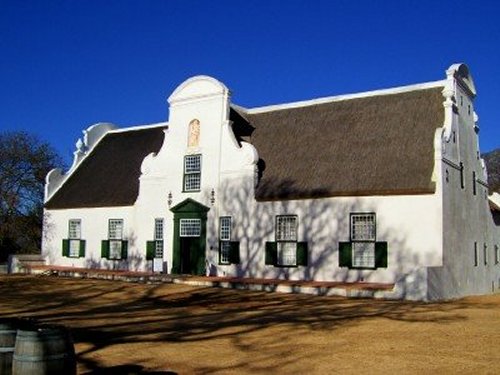GROOT CONSTANTIA MUSEUM
The farm, Groot Constantia, dates back to 1685, when the land was granted to Simon van der Stel – thus making it one of the oldest wine farms in South Africa. Its Orientation Centre in the Jonkershuis complex uses panel, object and archaeological displays to give an overview of Groot Constantia from the past to present, including slavery on the estate. Carriages are on display in the Coach House and in the historical wine cellar, while the Wine Museum exhibits wine storage and drinking vessels from antiquity to the early 20th century. The Manor House, with its exhibition of furniture, paintings, textiles, ceramics, brass, and copperware, provides an insight into the life of a successful 18th to late 19th century Cape farmer.
Groot Constantia Homestead and Wine Museum
The house is furnished as the home of affluent farmers of the 18th to early 19th century at the Cape. Furniture was placed in pairs and paintings according to themes where possible. Most of the furniture in the house was made at the Cape.
During restoration in 1926, the architect Kendall and his team discovered traces of decorative motifs which included stencilwork and dados on the interior of the entrance hall of the house. These motifs must have been removed, as no trace of them could be found during the recent restoration. The paint colours and dadoes are typical of Cape houses of the 18th century.
The entrance hall contains furniture and paintings which date from the late 18th to early 19th century. The festoon blinds or ophaalders are similar to those used by the Cloetes, the family who owned the farm from 1778 - 1885.
The study is to the left of the entrance hall. The men traditionally gathered here to converse and to smoke a pipe of tobacco. Furniture used for writing is found here. The objects in the room date from the 18th century to early 19th century and the furniture is in the Neo-Classical or Louis XVI style. The earthenware is of Delft and Chinese origin and was made for household use. The paintings depict military scenes and a horse rider.
The bedroom on the eastern side with its view of the garden, vineyards and sea is situated next to the study. This is the main bedroom and the owner of the farm and his wife slept here. The furniture and other objects date from the 18th and 19th centuries. The four-poster bed is reputed to have belonged to the Afrikaans poet J H Hofmeyr and is typical of four-poster beds used at the Cape. During this time houses did not have bathrooms and toilet facilities. The baby bath and bidet are examples of portable washing facilities used.
The kitchen contains objects from the 17th to 19th centuries. The spindle chairs, described by some as slave chairs, were found in kitchens of the time. The Frisian tail clock or staartklok was traditionally used in Friesland as a kitchen clock and would also have been used as such in the Cape.
The dining hall is the biggest room in the house and is the enlarged passage of the original Van der Stel house. Here the Cloetes entertained visitors and guests, apparently every day. The room is furnished with objects used in dining-rooms during the 18th and 19th centuries. The paintings have a seafaring theme.
The workroom was originally used as a bedroom. Objects in the room date from the 18th and 19th centuries. The paintings have interiors as their theme.
The bedroom on the western side is furnished with objects from the 18th to 19th centuries.
The women used to gather or kept themselves busy with handiwork in the drawing-room or sitting-room. At the time of the Cloetes, the room had many mirrors as is presently the case. The furniture in the room dates from the 18th century and is in the Rococo or Louis XV style.
The cellars below the house are probably those of the ground floor of the original Van der Stel house. The rooms were used by the Cloetes as storage area for good-quality bottled wine, vegetables and fruit. The rooms with windows were used as living space and workplaces for slaves and later for house servants. The area below the bedroom on the western side is a chicken run.
The Wine Museum is situated in a part of the historic wine cellar. Storage and drinking vessels for wine, dating from antiquity to the early 20th century are presently exhibited. A room next to the wine cellar was used by the Cloetes as an office for wine sales, with the desk they used as one of the exhibitions.
The Wine Museum is also used to exhibit a part of the carriage collection, amongst which are a Sefton Landau, Cape Cart, Ralli Cart, Buggy and a Farm Cart. The remainder of the carriage collection on the farm is exhibited in the coach house that forms part of the Jonkershuis complex. Amongst them are light trolleys or 'molwaens', a wagon drawn by six horses and a pioneer wagon known as a 'kakebeenwa'.
Hours
Open daily 10:00-17:00
Closed Workers Day and Christmas Day
Entrance fees
Facilities
Parking: Yes
Disabled access: Yes
Café: Yes
Conference facilities: Yes

|